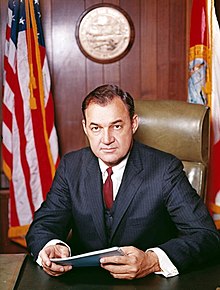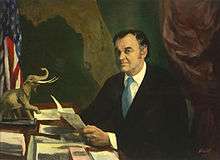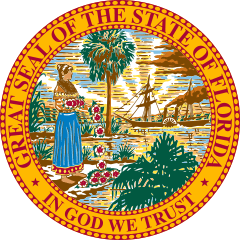Claude R. Kirk Jr.
Claude Roy Kirk Jr. (January 7, 1926 – September 28, 2011) was the 36th Governor of the U.S. state of Florida (1967–1971). He was the first Republican Governor of Florida since Reconstruction.[1]
Claude R. Kirk Jr. | |
|---|---|
 Official portrait of Governor Claude R. Kirk, January 1967 | |
| 36th Governor of Florida | |
| In office January 3, 1967 – January 5, 1971 | |
| Lieutenant | Vacant Ray C. Osborne |
| Preceded by | W. Haydon Burns |
| Succeeded by | Reubin Askew |
| Personal details | |
| Born | Claude Roy Kirk Jr. January 7, 1926 San Bernardino, California, U.S. |
| Died | September 28, 2011 (aged 85) West Palm Beach, Florida, U.S. |
| Resting place | South Florida National Cemetery, Lake Worth, Florida, U.S. |
| Nationality | American |
| Political party | Republican (1960–1978, after 1990) |
| Other political affiliations | Democratic (prior to 1960); (1978–1990) |
| Spouse(s) |
|
| Children | 7 |
| Alma mater | Duke University University of Alabama |
| Profession | Businessman |
| Military service | |
| Allegiance | |
| Branch/service | |
| Rank | Second lieutenant |
| Battles/wars | World War II and Korean War |
Early life
Kirk was born in San Bernardino, California. He lived in Chicago, Illinois, and Montgomery, Alabama, where he attended Sidney Lanier High School. After graduating at age seventeen, he enlisted in the U.S. Marine Corps reserve and rose to the rank of second lieutenant, having served stateside during World War II. He briefly attended Emory University in Atlanta, Georgia, before he transferred to Duke University in Durham, North Carolina, where he earned a Bachelor of Science degree. Kirk was accepted at the University of Alabama School of Law in Tuscaloosa and graduated in 1949. He was recalled to the Marines for the Korean War and was initially assigned to the 1st Marine Division. He later served aboard the battleship USS New Jersey and was discharged as a first lieutenant in 1952.[2]
Business
Kirk worked as an insurance salesman and sold building supplies before partnering with W. Ashley Verlander in 1956 to start the American Heritage Life Insurance Company in Jacksonville, Florida. He had no money of his own, so he recruited investors and his brother-in-law to bankroll the venture. The firm catered to the wealthy and quickly became one of the most successful in the industry, earning Kirk a fortune. Six years later, he left American Heritage Life and purchased a partnership in the New York securities firm, Hayden Stone, selling investments to Floridians.[3]
Early political career
In 1960, Kirk switched his party affiliation from Democrat to Republican and headed the "Floridians for Nixon" campaign, which helped the Republican Party win the state's then ten electoral votes for the third consecutive time.
In 1964, Kirk ran as a Republican against veteran Democratic US Senator Spessard Holland, a former governor and epitome of the Florida Democratic establishment. He was considered a placeholder on the ballot, with Republican presidential nominee Barry M. Goldwater losing Florida to U.S. President Lyndon B. Johnson. Kirk polled 36.1 percent of the vote.
Thereafter, Kirk became embroiled in an intraparty squabble with US Representative William C. Cramer of St. Petersburg. Cramer recalled Kirk having "begged me" to allow him to address meetings held during the 1964 delegate and national committeeman races. Thus, Kirk became acquainted with Republican activists who could be helpful to him his later career.[4]
Governor

In 1966, Kirk scored a huge upset to become governor, defeating Democrat Robert King High, the mayor of Miami, 55–45 percent. High had unseated incumbent governor Haydon Burns, a Conservative Democrat, in the Democratic primary. In the general election, Kirk won majorities in 56 of the state's 67 counties.[5]
Burns's refusal to support High was a major factor in Kirk's decisive victory in the general election. Upon taking the oath of office on January 3, 1967, he became the state's first Republican governor in 90 years. During his single four-year term in office, a new Florida Constitution went into effect in 1968. The governor was often at odds with both Democrats and his Republican colleagues in the legislature on issues such as growth and taxes. He earned the nickname Claudius Maximus because of his brash, acerbic style of leadership and opinionated, colorful personality.[1] A significant event of his tenure was a controversial statewide teachers' strike in 1968.
One of the major themes of Kirk's campaign was his strong support for capital punishment, in contrast to Collins', Bryant's and Burns' opposition to capital punishment. Kirk promised to resume executions (the last had taken place in Florida in 1964), but no executions occurred during his administration, mostly because of an informal nationwide moratorium. Kirk made headlines when, during the campaign, he visited Florida State Prison and, after shaking hands with several death row inmates, said, "If I'm elected, I may have to sign your death warrants."[6]
Kirk's management style was described as flamboyant and confrontational.[7] He especially opposed court-ordered mandatory busing.[8] In 1970, as he geared for a reelection bid, he tried to halt a desegregation plan in Manatee County. He quipped that the pro-busing judges of the United States Court of Appeals for the Fifth Circuit, based in New Orleans, were "drinking in the French Quarter and reading dirty books."[9]
Although he had a Democratic-controlled legislature, Democrats did not have a veto-proof majority during Kirk's term of office.[10]
During Kirk's term, the Dade County Port Authority began secretly buying land in the Everglades to build an airport. Governor Kirk turned a ceremonial shovel of dirt at the groundbreaking. Kirk was a strong supporter of what would have been the world's largest airport despite evidence that it would destroy the water-recharge area South Florida needed. His transportation secretary, Michael O'Neil, stated, "I call the Everglades a swamp. My children can't play in it." The work was ultimately halted on September 17, 1969, after an Interior Department study ordered by Nixon.[11]
After the publication of John Filo's photograph showing Mary Ann Vecchio of Florida kneeling over the body of Jeffrey Miller at the Kent State University shootings on May 4, 1970, then Governor Kirk publicly labeled Vecchio a dissident "communist".[12]
Feud with Cramer
The schism between Cramer and Kirk accelerated in 1966 to the point that in a 1988 interview, Kirk said that he could not recall Cramer having rendered him any assistance at all in either the 1964 or 1966 campaigns: "Cramer never helped me do anything. At all times he was a total combatant."[13]
Kirk claimed that Cramer wanted the 1966 gubernatorial nomination himself after Burns, the primary loser, refused to endorse Mayor High, an ally of U.S. Senator Robert F. Kennedy of New York. Kirk said that Cramer's legislative assistant, Jack P. Inscoe, later a real estate developer from Tampa, could verify that Cramer had asked Kirk to bow out of the race with High. Kirk claimed that the three met "in a car... probably in Palm Beach County." Inscoe said: "This never happened. Kirk is not known for telling too much truth."[13] Though Cramer said that he had no ambition to be governor, Kirk retorted, "How could I have brought this up if it didn't happen?"[13]
Cramer said that he subsequently urged Kirk to merge his own organization into the regular party structure in Cramer's home county of Pinellas. However, Kirk maintained a separate entity in the hope of maximizing crossover support from conservative Democrats unhappy with the nomination of Mayor High. Cramer recalled this disagreement over strategy as the "first indication that Kirk intended to do his own thing and attempt to form his own organization within the Republican Party in Florida. I didn't get the signal at the time, but it became very obvious later, particularly when he attempted to defeat me as national committeeman in 1968."[13]
Kirk asked the representative and later Senator Edward Gurney of Winter Park serve as chairman of the 1967 gubernatorial inauguration although Gurney had not been involved in the Kirk campaign. By contrast, Cramer was not even asked to serve on the inaugural committee. In 1968, Governor Kirk dispatched his staff to the Republican state convention in Orlando to push for Cramer's ouster as national committeeman. Kirk justified his move against Cramer: "I wanted my own man. After all, I was the leader of the party. If Cramer had been the leader of the party, he would have wanted his own man too."[14] Cramer said that Kirk was attempting to be "not only the governor but the king of the party, and I was about the only person at the time who stood in his way from taking total control."[14]
Despite Kirk's opposition, Cramer attributed his retention in 1968 as national committeeman to the loyalty of organizational Republicans: "I had proved myself an effective congressman. I was on the House leadership as vice chairman of the Republican Conference and was ranking member on the then named House Public Works Committee."[14]
In 1988, Cramer recalled a visit 21 years earlier to Kirk's office when a former state legislator was denied an appointment with the governor even though the man was a stalwart Republican. According to Cramer, "Kirk made it very clear that he got a great deal of joy in making sure that this guy didn't get an appointment.... He just loved to kick people in the teeth to show how much power he had."[14]
Despite observing this incident, Cramer said that party unity led him to avoid public criticism of Kirk. Cramer viewed Kirk as "his own worst enemy."[14] Kirk claimed that he had never had a "serious discussion" on any topic with Cramer.[14] Walter Wurfel, a Floridian who was later U.S. President Jimmy Carter's deputy press secretary, termed Kirk's election in 1966 as "the worst thing that could have happened to the Republicans. He wasn't interested in the Republican Party; party was a matter of convenience for him."[15]
Cramer said he believed that Kirk may have become vice president or even president had he tended to his gubernatorial duties rather than openly seeking the second position. Eyeing the vice presidency in 1968, Kirk stood alone in the Florida delegation at the 1968 Republican National Convention in Miami Beach by supporting Governor Nelson A. Rockefeller of New York, rather than the clear frontrunner, Richard Nixon. Cramer said that Nixon may have selected Kirk, rather than Spiro T. Agnew of Maryland for the second slot had Kirk concentrated on his duties of office. Kirk claimed that it "had been agreed" that he would run with either Rockefeller or Nixon, but Nixon chose Agnew in the hope of enhancing campaign contributions from Greek American businessmen.[16]
Defeat
In 1970, Kirk was challenged in the primary by drug store magnate Jack Eckerd of Clearwater and state senator and later US Representative L. A. "Skip" Bafalis. Eckerd said that though he had supported Kirk in 1966, he became disappointed and embarrassed with Kirk: "I was offended by his public behavior and chagrined that he was a Republican."[17]
With no candidate getting 50%, Kirk and Eckerd met in a runoff, which Kirk won. The challenges strained Kirk and used up campaign funds. Despite Kirk's tactics, Eckerd said "time heals all wounds, and now I chuckle about it." He added that his defeat in 1970 probably prolonged his life.[18]
In the general election, Kirk lost 57%-43% to Democrat state senator Reubin O'Donovan Askew, from Pensacola. In that same 1970 general election, William Cramer, Kirk's intraparty nemesis, lost to Democrat Lawton Chiles (himself a future Florida governor) of Lakeland for the U.S. Senate seat that Spessard Holland finally vacated. Cramer had defeated Kirk's preferred Senate choice, Fifth Circuit Court Judge G. Harrold Carswell of Tallahassee.
When Kirk's term of office ended on January 5, 1971, he returned to his business pursuits, but he later campaigned several times for governor, senator, and Florida commissioner of education under both Democratic (1978) and Republican (1990) labels.
Personal life
Kirk met Sarah Stokes while he was in law school. Her family owned an automobile dealership, and the couple married in 1947. They were divorced in 1950, but remarried in 1951. The union produced four children: two daughters, Sarah and Kitty, and twin sons Frank and Will. They divorced for the final time in 1966.[3] In a 1967 interview, Sarah Stokes commented that Kirk "drinks to excess quite often (and) has indiscreet public associations with other women".[19]
A divorcee when he took office, Kirk, then 41, married German-born Erika Mattfeld, 33, on February 18, 1967.[20] She was an actress whom he had met during an unsuccessful business venture in Brazil.[3] From his final marriage he had two daughters and a son.
Kirk's daughter Kitty married Ander Crenshaw, a former U.S. Representative from Florida's 4th congressional district.[1]
In February 2011, Kirk survived a mild heart attack. He died in his sleep on September 28, 2011.[2]
Electoral history
United States Senate election in Florida, 1964:[21]
- Spessard L. Holland (D) (inc.) – 997,585 (63.93%)
- Claude R. Kirk Jr. (R) – 562,212 (36.03%)
- Write-in – 540 (0.04%)
1966 Florida gubernatorial election:[22]
- Claude R. Kirk Jr. (R) – 821,190 (55.13%)
- Robert King High (D) – 668,233 (44.86%)
- Write-in – 238 (0.02%)
1968 New Hampshire Republican vice presidential primary:[23]
- Austin Burton – 10,987 (29.80%)
- Lawrence C. Smith – 9,291 (25.20%)
- John A. Volpe – 5,611 (15.22%)
- Claude R. Kirk Jr. – 4,842 (13.13%)
- Ronald Reagan – 4,108 (11.14%)
- George W. Romney – 1,035 (2.81%)
- Paul C. Fisher – 998 (2.71%)
1970 Florida gubernatorial election:[24]
- Reubin Askew/Thomas Burton Adams Jr. (D) – 984,305 (56.88%)
- Claude R. Kirk Jr./Ray C. Osborne (R) (inc.) – 746,243 (43.12%)
See also
References
- Bauerlein, David: "Former Florida governor Claude Kirk dies" Florida Times-Union, September 28, 2011
- Bousquet, Steve: "Former Florida Gov. Claude Kirk dies at age 85" St. Petersburg Times, September 28, 2011
- Basse, Craig: "Former Gov. Claude Kirk dead" Lakeland Ledger, September 28, 2011
- Billy Hathorn, "Cramer v. Kirk: The Florida Republican Schism of 1970", Florida Historical Quarterly (April 1990), p. 407
- State of Florida, General election returns, November 8, 1966
- Michael Mello, Deathwork: Defending the Condemned, University of Minnesota Press, 2002, ISBN 0-8166-4088-2, ISBN 978-0-8166-4088-1
- "Races: Ain't Nobody Gonna Touch King Claude". TIME. 1970-04-20. Retrieved 2014-03-20.
- "Florida: How to Win by Losing". TIME. 1970-04-27. Retrieved 2014-03-20.
- Miami Herald, September 5, 1970
- "Florida: A New Way of Operating". TIME. 1967-04-07. Retrieved 2014-03-20.
- James C. Clark (2014-09-07). "Politics moved Nixon, but Fla. reaped environmental benefits". Orlando Sentinel. Retrieved 2015-10-19.
- Munzenrieder, Kyle: "Former Florida Gov. Claude Kirk, "a Tree-Shakin' Son of a Bitch," Dies at 85" Miami New Times, September 28, 2011
- "Cramer v. Kirk," p. 408
- "Cramer v. Kirk," p. 409
- Alexander P. Lamis, The Two-Party South (New York, 1984), p. 292
- "Cramer v. Kirk", pp. 409-410
- "Cramer v. Kirk", p. 416
- Jack M. Eckerd and Charles P. Conn, Eckerd (Old Tappan, New Jersey, 1987), pp. 113-119
- Associated Press: "Former Florida. Gov. Claude Kirk Dies At 85" National Public Radio, September 28, 2011
- "Florida: I, Claudius". TIME. 1967-12-15. Retrieved 2014-03-20.
- "FL US Senate Race – Nov 03, 1964". Our Campaigns. Retrieved 2014-03-20.
- "FL Governor Race – Nov 08, 1966". Our Campaigns. Retrieved 2014-03-20.
- "NH US Vice President – R Primary Race – Mar 12, 1968". Our Campaigns. Retrieved 2014-03-20.
- "FL Governor Race – Nov 03, 1970". Our Campaigns. Retrieved 2014-03-20.
External links
- Official Governor's portrait and biography from the State of Florida
- A sampling of Jim Ivey's contemporary editorial cartoons about Claude Kirk
- Claude R. Kirk Jr. at Find a Grave
| Political offices | ||
|---|---|---|
| Preceded by W. Haydon Burns |
Governor of Florida January 3, 1967 – January 5, 1971 |
Succeeded by Reubin Askew |
| Party political offices | ||
| Preceded by Leland Hyzer |
Republican nominee for United States Senator from Florida (Class 1) 1964 |
Succeeded by William C. Cramer |
| Preceded by Charles R. Holley |
Republican nominee for Governor of Florida 1966, 1970 |
Succeeded by Jerry Thomas |
